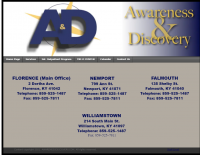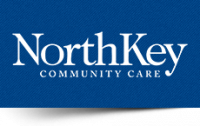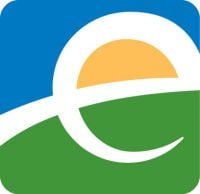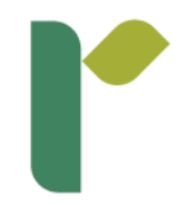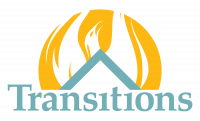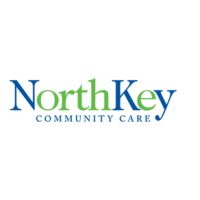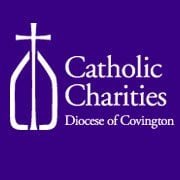Awareness and Discovery - Florence
Drug Rehab Center in Florence, Kentucky
Awareness and Discovery - Florence is a mental health and addiction treatment center in Kentucky that offers personalized and evidence-based recovery services, including outpatient and residential treatment, cognitive behavioral therapy, and relapse prevention to help clients achieve long-term sobriety.
About Awareness and Discovery - Florence in Kentucky
Awareness and Discovery - Florence is a comprehensive mental health and addiction treatment center located in Florence, Kentucky. They offer a wide range of recovery services to individuals who are struggling with addiction and mental health issues, including outpatient and residential treatment, medication management, cognitive behavioral therapy, and relapse prevention. Their staff of experienced and licensed mental health professionals is committed to providing personalized, evidence-based treatment to help their clients achieve and maintain long-term sobriety.
At Awareness and Discovery - Florence, they are dedicated to creating an individualized treatment plan that meets the unique needs of each client. Their comprehensive approach to addiction recovery includes counseling, support groups, lifestyle management, and relapse prevention. They also specialize in creating customized treatment plans for those who are dual-diagnosed, such as those with a mental health disorder and a substance use disorder. They strive to build a strong foundation for lasting sobriety and a healthier and more fulfilling life.
Awareness and Discovery - Florence is accredited by the Commission on Accreditation of Rehabilitation Facilities (CARF) and is licensed by the Kentucky Department of Health. They also offer specialized programs for teens, such as the Teen Addiction & Recovery Support program, which provides a safe and supportive environment for adolescents to recover and gain the skills and awareness needed to prevent relapse. Moreover, their staff is committed to providing the highest quality of care, and they are constantly striving to improve their services and make an impact in the recovery community.
Genders
Ages
Modality
Additional
Conditions and Issues Treated
Opioid addiction treatment should be done in a medically supervised drug rehab. While taking opioids, users will typically use other substances to enhance the effects of opioids or to reduce the adverse effects of opioid use. Opioid addiction treatment will include detoxification and drug rehab counseling to help both the user and their loved ones learn how to live a successful sober lifestyle.
Treatments such as methadone, buprenorphine, and naltrexone are three medications that can help treat opioid addiction. These drugs work on the brain’s pleasure center and reduce cravings and the effects of illicit opioids such as heroin. These drugs can be either given orally or by injection. Individual drug rehab counseling sessions can be helpful to discuss any questions or concerns with the drug treatment program. This counseling will also help the user set goals for when they finish drug rehab.
Opioid addiction recovery is a long process. Many of the changes to the brain caused by opioid use cannot be undone, but with time and the proper treatment, a person can return to normal function. After detox, treatment will include drug rehab counseling and entering a halfway house or sober living community. Aftercare is critical to long-term recovery, as it helps the user avoid relapsing and entering back into drug rehab.
Levels of Care Offered
This center offers a variety of custom treatment tailored to individual recovery. Currently available are Aftercare Support, Drug Rehab, Dual-Diagnosis, Inpatient, Intensive Outpatient, Outpatient, Residential, with additional therapies available as listed below.
Inpatient treatment for alcoholism or drug addiction is an option that provides the addict with a supportive environment in which they can stop using. This type of treatment is appropriate for addicts that are most in need of intensive care and supervision. This includes those who were unable to quit on their own, those who need more structure than they can get in outpatient treatment.
Intensive outpatient treatment is a type of comprehensive addiction care. Unlike conventional residential treatment programs, the patients live at home during the recovery process. This means that one can continue working and caring for their families. These also allow people to keep pursuing their studies while also working on their sobriety.
Outpatient treatment can help one transition to normal life from the round-the-clock supervision and treatment available during inpatient treatment. It is an excellent tool to ensure long-term recovery. However, it is essential to note that intensive outpatient treatment in itself does not remove patients from the real-world setting. This means there’s always a higher risk of coming across environmental triggers. To further prevent relapse, an outpatient treatment center should be able to provide ongoing support services.
Once the patient is enrolled in an intensive outpatient treatment program, they will be expected to attend therapy and group meetings daily for a stipulated period. The frequency and duration of each session will depend on the patient’s needs and level of addiction. This can help curb the habit and deal with underlying issues that led to it. Most of these professional treatments are designed to allow patients to structure their daily schedules in a way that is conducive to recovery.
“Outpatient treatment is ideal for those who have a lower intensity addiction. It’s also suitable for those with a supportive environment and those on a tight budget.
Outpatient treatment can be considered the lowest intensity level of addiction treatment. It is ideal for early phase addiction or lower intensity addictions. It may involve weekly sessions instead of daily. Peer group support, 12-step programs, and individual counseling may still be used and anti-addiction medication.
Residential treatment programs are those that offer housing and meals in addition to substance abuse treatment. Rehab facilities that offer residential treatment allow patients to focus solely on recovery, in an environment totally separate from their lives. Some rehab centers specialize in short-term residential treatment (a few days to a week or two), while others solely provide treatment on a long-term basis (several weeks to months). Some offer both, and tailor treatment to the patient’s individual requirements.
Aftercare support is vital to those who have completed a drug or alcohol treatment program. This support comes in individual and family counseling, treatment of psychiatric and other medical conditions, and medications to reduce cravings. It helps recovering addicts adjust to normal day-to-day activities and can last for a year or longer.
The majority of drug and alcohol addicts who receive aftercare treatment do not relapse. It is estimated that without aftercare, the relapse rate will be between 70 to 90 percent for most people. Aftercare is the final stage in addiction recovery, but it will also help maintain sobriety if relapse does occur.
Therapies & Programs
No single treatment works for all addicts; therefore, the goal of treatment and therapy should be to find what works best for each individual. Some people requiring addiction treatment may only need a few weeks of inpatient care. Others will require long-term residential care. Tolerance and withdrawal levels vary from person to person and thus affect the intensity of the treatment needed.
If an individualized approach to treatment and therapy is not offered, addicts may fail to reap benefits from their efforts. Professionals must customize plans according to their patient’s needs, limitations, and strengths. The goal of all forms of addiction treatment should be for addicts to find healthy ways to cope with their addiction and its underlying causes.
Couples therapy for drug addiction is a unique form of therapy that allows family members to work through the emotional issues of their loved one’s addiction together. Family members can support each other while learning how to cope with the addiction and encourage healthy changes.
Accordingly, couples therapy for drug addiction is designed for an addict and their significant other or spouse. The two will work with a therapist to learn how the addiction affects themselves and the relationship and how to break the negative patterns of behavior that may have developed.
Drug addiction can destroy a person’s life, as well as their family and friends. The loss of one’s ability to choose how to live and behave often leads the addict into depression, anger, guilt, and many emotional problems.
The therapies usually include siblings, children, and parents who are involved in their daily lives. These sessions are vital because they address past issues that may have hampered an addict’s or alcoholic’s recovery and provide support at a crucial time!
One of the most critical aspects of family therapy is helping addicts’ loved ones see their situation in a new light. It’s also one of the most challenging things a family can do when a loved one struggles with addiction or alcoholism.
Group therapy is held in a safe, controlled setting where patients can feel comfortable sharing their struggles and gaining perspective through shared conversations. It takes place in a group rather than one on one to prevent feelings of isolation or being unique in their situation while creating an environment for addicts at Awareness and Discovery - Florence to develop fellowship, accountability, and support. Group therapy is an important tool in recovery that prevents cravings that prompt a return to active addiction.
Life skills training is beneficial for addicts in recovery because it helps them learn how to take care of themselves and improve their quality of life, which can promote feelings of purpose and motivation.
This type of treatment works by teaching individuals life-enhancing skills that support positive living, including:
- Healthy lifestyle habits
- Skills to effectively manage stress
- Effective communication skills to help them get their needs met without turning to drugs or alcohol
- Money management and budgeting skills so they can continue to take care of themselves after treatment ends.
Payment Options Accepted
For specific insurance or payment methods please contact us.
Is your insurance accepted?
Ask an expert, call (888) 674-0062
Awareness and Discovery Associated Centers
Discover treatment facilities under the same provider.
- Awareness and Discovery Group - Florence in Florence, KY
- Awareness and Discovery - Newport in Newport, KY
- Awareness and Discovery Group in Newport, KY
- Awareness and Discovery - Falmouth in Falmouth, KY
- Awareness and Discovery - Williamstown in Williamstown, KY
Learn More About Awareness and Discovery Centers
Additional Details
Specifics, location, and helpful extra information.
Florence, Kentucky 41042 Phone Number(859) 525-1487 Meta DetailsUpdated November 25, 2023
Staff Verified
Awareness and Discovery - Florence Patient Reviews
There are no reviews yet. Be the first one to write one.
Florence, Kentucky Addiction Information
Kentucky ranks among the top ten states for opioid-related overdoses. Most of these are due to heroin, fentanyl, and prescription opioid use. A little over 11% of the Kentucky population abuses alcohol in a given year. More than 15% of Kentucky adults admit to participating in binge drinking every month.
2 out of every 15 teenagers in Florence are struggling with alcoholism. 8% of residents are addicted to at least one substance, including alcohol and weed. About 300 people in the region inject drugs like heroin and meth on a regular basis. 100 people die annually from a drug overdose in the area. Drug treatment centers in Florence offer specialized procedures to help people overcome their addiction to drugs and alcohol.
Treatment in Nearby Cities
- Irvine, KY (96.7 mi.)
- Providence, KY (203.5 mi.)
- Hyden, KY (144.4 mi.)
- Kings Mountain, KY (112.8 mi.)
- London, KY (132.9 mi.)
Centers near Awareness and Discovery - Florence
The facility name, logo and brand are the property and registered trademarks of Awareness and Discovery - Florence, and are being used for identification and informational purposes only. Use of these names, logos and brands shall not imply endorsement. RehabNow.org is not affiliated with or sponsored by Awareness and Discovery - Florence.
